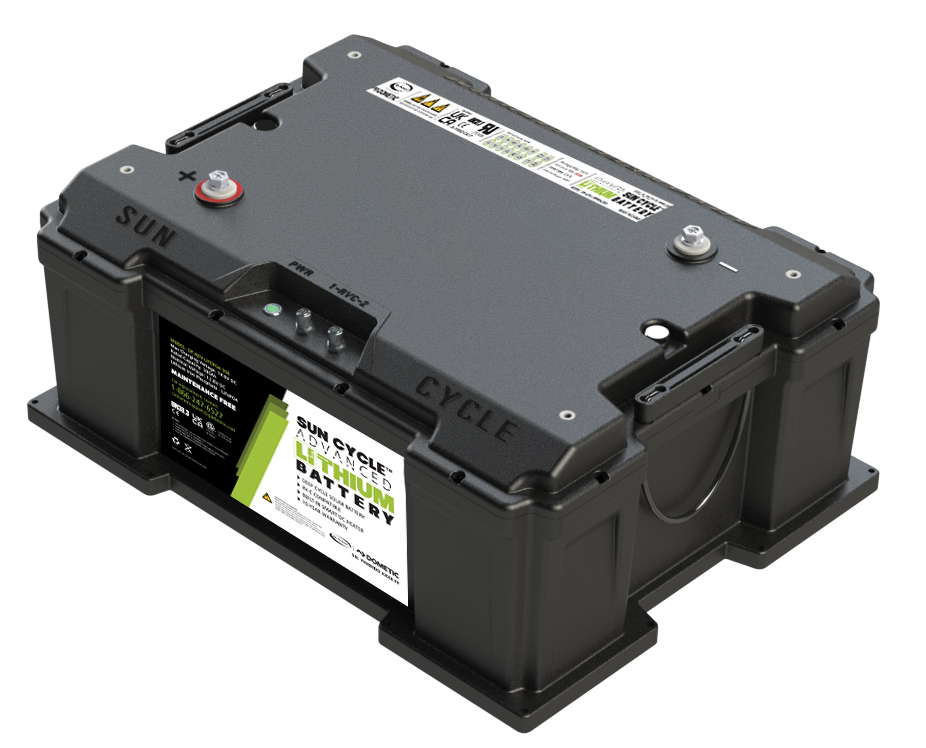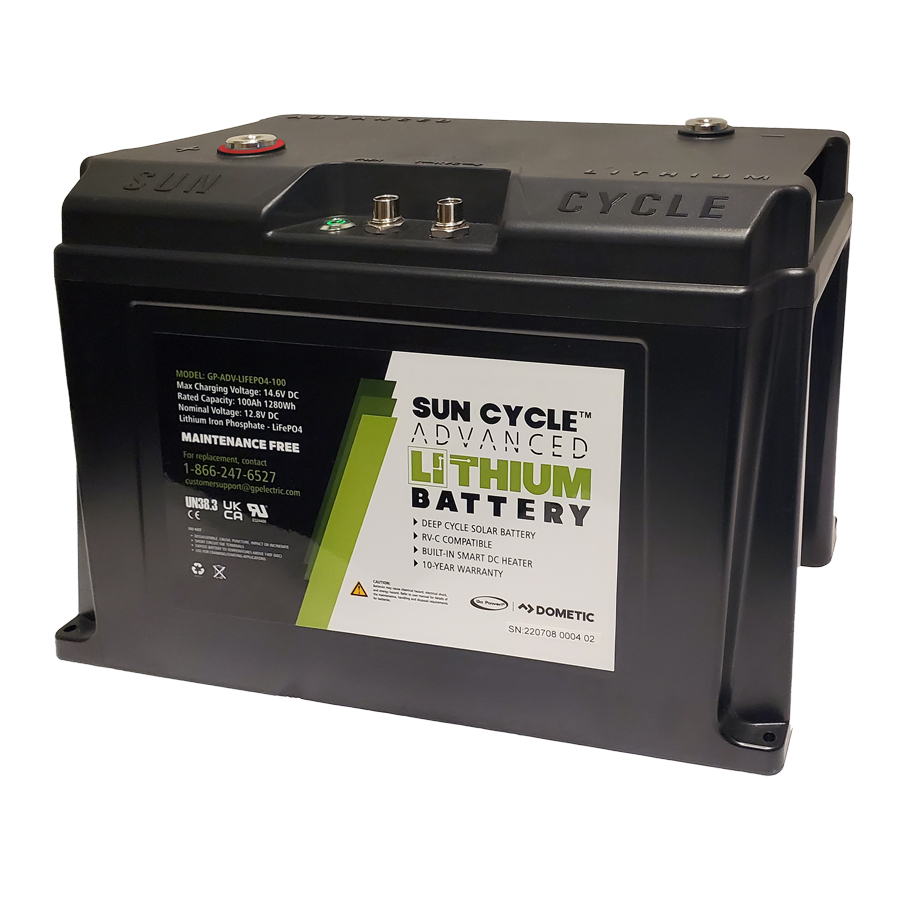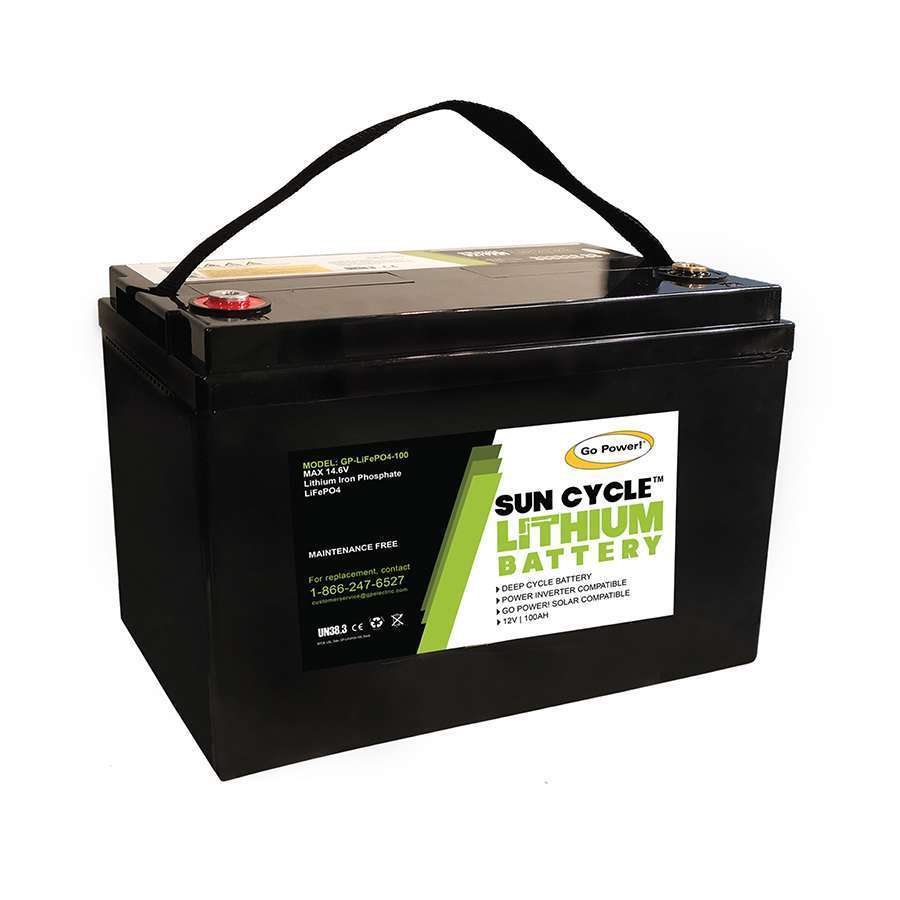RV Power: Examining the Top 5 Myths vs Facts About RV Lithium Batteries
If you’re like most RVers, you’re always looking for ways to get more performance out of your rig. With the promise of a longer lifespan and the ability to venture further off-grid, light-weight lithium batteries are a hot topic in the RV community.
As with any new technology, there’s a lot of information circulating about lithium batteries — and not all of it is accurate. Let’s look at some common myths about lithium power to see if they’re fact, fiction, or somewhere in between.
 Lithium technology is unsafe.
Lithium technology is unsafe.
Verdict — FICTION
Lithium battery technology has dramatically improved since its introduction into the RV world. Today, the most popular chemistry used for RV batteries, lithium iron phosphate (or LiFePO4), utilizes lower energy densities than other lithium-ion battery types and is much safer to use. Today’s lithium batteries should also come equipped with a battery management system (BMS) that is UL-certified or independently tested. If the battery you’re considering doesn’t have a BMS, you should look elsewhere.
 It matters where you install your batteries
It matters where you install your batteries
Verdict — FACT
Lithium batteries are expensive, and RVers are eager to protect their investment. One way to do that is to carefully consider where you install your batteries.
While traditional lead-acid or AGM batteries can be placed in colder locations (like the tongue of your RV), lithium batteries perform much better in regulated temperatures. The good news is that lithium batteries are compact and don’t require venting, so they’re easy to move inside your RV (e.g., under a dinette or bed).
Some battery manufacturers have gone even further to protect lithium cells from cold temperatures and have begun equipping their batteries with built-in heaters. These heaters use DC power from the battery itself and are integrated with the BMS.
However, for most RV operators, locating their lithium batteries within the RV is a simpler, more cost-effective solution.
 Lithium batteries allow you to use your AC while off-grid
Lithium batteries allow you to use your AC while off-grid
Verdict — FACT but with sidenotes
While the short answer is yes, how long lithium batteries can run an air conditioner depends on several factors, including battery bank size and the size of the RV AC unit.
A 100 Ah lithium battery will power a typical 15,000 BTU RV air conditioner for 30 minutes or less before fully discharging. If you are RVing in the middle of summer, as most do, that 30 minutes likely won’t do much to cool you down.
In addition, if you’re relying on solar to recharge, you could be left without enough useable daylight to make up the lost power from using the air conditioner for even a short amount of time.
NOTE that, in addition to lithium batteries, an inverter is needed to invert the 12-volt DC battery power into the 120 AC power required for most air conditioning units.
HOWEVER, newer units with 12V air conditioners are more efficient. They don’t require an inverter, are more efficient, and will run longer on battery power than traditional AC units.
It’s critical to emphasize that running the AC will drain any battery bank completely. If your customers rely on solar to charge their batteries, they will have to wait until the next day to recharge their batteries, leaving them in the dark overnight.
However, if they have a hybrid inverter/charger combo unit that can combine generator power with solar power, they can recharge the batteries quicker or use a smaller generator for even longer run times.
Operating high-draw appliances like an RV air conditioner requires a huge amount of energy. Even with the power in a lithium battery bank, smaller battery setups may not be able to keep up with the mid-day heat.
 Upgrading to lithium only involves the battery
Upgrading to lithium only involves the battery
Verdict — FICTION
Many battery manufacturers position battery upgrades as drop-in replacements, which is generally true. However, customers switching to lithium must also consider the impact on their complete DC charging system.
The cost for a lithium battery alone can be up to 5 times as much as a traditional lead-acid battery. While this price includes the required BMS, it doesn’t factor in the device(s) needed to charge a lithium battery properly, which could add even more to your upgrade costs. These devices may include:
Stock chargers
Charging time and voltage requirements differ by battery chemistry. It’s critical to use the correct settings when charging each battery type to avoid over-voltage damage and achieve a proper, full charge. This also holds true for lithium batteries.
All battery chargers in a camper should have a LiFePO4 setting, be specifically made for lithium, or allow a custom input voltage setting. Other charge settings simply cannot generate the voltage necessary to charge the battery properly. Therefore, if you’re going to make a significant investment to upgrade to lithium batteries, you must ensure you have the proper setup to charge them correctly.
DC to DC units
This type of battery charger, common in coaches that use a starting battery and a house battery, uses 12v instead of 120v. These chargers connect the alternator to the house battery as an additional charging source.
This means not only is the starter battery charging while driving, the battery powering the RV amenities is also being charged.
However, when upgrading a “house” battery bank from traditional lead-acid to lithium, you must ensure the DC-to-DC charger can provide the correct charging voltage in the RV. That will help keep your expensive lithium batteries healthy by protecting them from the irregular voltage spikes some alternators tend to give off.
 Lithium batteries aren’t worth the cost
Lithium batteries aren’t worth the cost
Verdict — IT DEPENDS
RV Lithium batteries require a significant investment and are not for everyone. However, they offer many benefits — they’re lighter, hold more power, can be discharged deeper, and last longer.
In many cases, lead-acid batteries perform adequately. If you only use your RV a few weeks out of the year, a good-quality, deep-cycle battery may meet all of your requirements.
However, if you can afford to replace your lead batteries with lithium, you’ll likely save money over time. Lithium will double your available power off-grid, are maintenance-free, and enjoy a more extended product warranty.
Are You Ready For Lithium Batteries?
RV Lithium batteries are lighter, cleaner, safer, and more efficient than traditional solutions — and lithium technology is here to stay. Depending on how (and where) you use your RV, the additional performance and convenience that lithium offers could make your lithium battery upgrade a compelling and worthwhile investment.
Find your Go Power! lithium battery here



NEW 300AH ADVANCED LITHIUM BATTERY
GP-ADV-LIFEPO4-300
The bigger, better battery. 300Ah LiFePO4 Advanced Lithium Battery from Go Power! is engineered for high performance and connectivity.
NEW 100AH ADVANCED LITHIUM BATTERY
GP-ADV-LIFEPO4-100
The NEW Sun Cycle® Advanced 100Ah Lithium Battery features a built-in heater, enhanced safety features, and is Bluetooth®-enabled
100AH LITHIUM IRON PHOSPHATE SOLAR BATTERY
GP-LIFEPO4-100
The Go Power! 100ah Lithium Iron Phosphate solar battery is a great upgrade from traditional lead-acid or AGM batteries with a built-in BMS.

